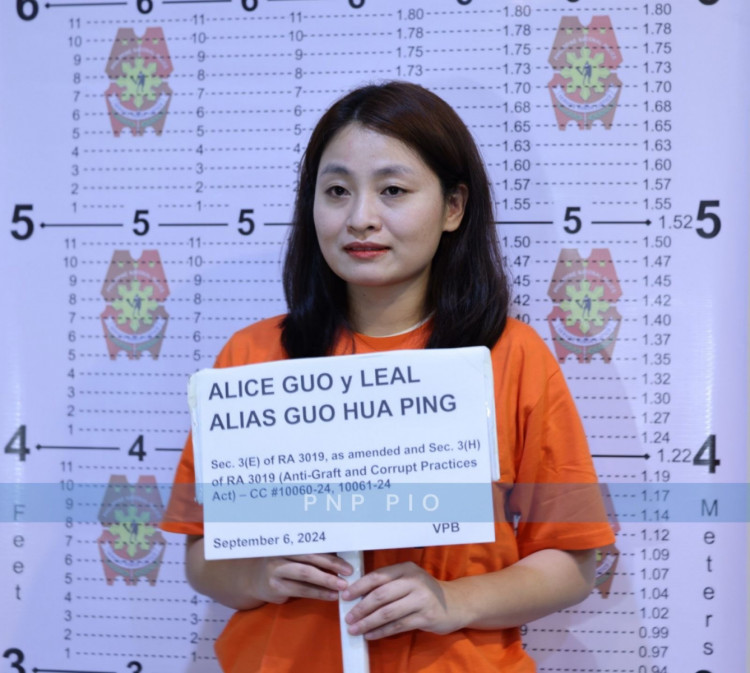Former Philippine mayor Alice Guo, embroiled in allegations of ties to Chinese criminal syndicates and money laundering, was deported to Manila on Friday after being apprehended by Indonesian authorities earlier this week. Guo, who also goes by the name Guo Hua Ping, had fled the Philippines in July and was captured in Jakarta, marking a significant development in a case that has drawn international attention.
Guo, 34, is accused of laundering over 100 million pesos ($1.79 million) and playing a key role in establishing illegal online gaming and scam operations catering predominantly to Chinese clients. The former mayor of Bamban, a town in the northern Philippine province of Tarlac, Guo had been under investigation by the Philippine Senate but refused to appear before congressional hearings, leading to a warrant for her arrest.
Philippine law enforcement agencies, including the Anti-Money Laundering Council (AMLC), have filed multiple counts of money laundering against Guo and 35 other individuals. These charges are part of a broader probe into the operations she allegedly facilitated. The Senate's investigation into Guo began in May, following a March raid on a casino in Bamban, which uncovered what authorities described as illegal activities run from a facility partly owned by Guo.
Upon her arrival in Manila, Guo was escorted by Philippine law enforcement, including Interior Secretary Benjamin Abalos Jr., who led the handover from Indonesian authorities. In a press briefing shortly after landing, Guo maintained her innocence, describing the accusations as malicious and politically motivated. "I have received death threats, and I am asking for the help of Philippine authorities," she stated, emphasizing her need for protection.
Secretary Abalos assured Guo of her safety but urged her to disclose all pertinent information regarding her alleged criminal connections. "Disclose all the names in order to serve justice and so all this ends. That is the only way we can help her," Abalos remarked, signaling the administration's intent to resolve the case swiftly.
Probably one of the MOST DISTURBING CLIP in the news right now. Paano nagagawang ngumiti at kumindat na parang artista nitong si Alice Guo??
Talagang mapagkakatiwalaan pa ba ang national authority kung makikita ang isang fugitive na ganito ka-comfortable matapos mahuli? Kadiri! pic.twitter.com/qDPjhYyhMU — ExhoNames (@echoechonames) September 5, 2024
Guo's legal troubles are compounded by her disputed nationality. While she asserts that she is a natural-born Philippine citizen, the National Bureau of Investigation (NBI) revealed in August that her fingerprints match those of a Chinese national named Guo Hua Ping. This discovery fueled further suspicions about her background and the legitimacy of her election as mayor in 2022.
In addition to her money laundering charges, Guo faces accusations of grave misconduct, which led to her removal from office by the Philippine Ombudsman, an agency responsible for investigating and prosecuting government officials accused of corruption and other crimes.
Guo's arrest and subsequent deportation were the result of coordinated efforts between the Philippine and Indonesian governments. Indonesian police arrested Guo on the outskirts of Jakarta, hoping to facilitate a detainee exchange that would see the repatriation of Gregor Johann Haas, an Australian national and one of Indonesia's most-wanted drug suspects, currently detained in the Philippines.
While discussions about the detainee swap are ongoing, the case of Haas adds another layer of complexity to the diplomatic relations between the involved nations. Haas, described as a high-profile fugitive associated with the Sinaloa cartel, faces the possibility of capital punishment if extradited to Indonesia. Australian laws prohibit extradition to countries where the death penalty is enforced, raising concerns about Haas's fate should the swap proceed.
Philippine President Ferdinand Marcos Jr. expressed gratitude to Indonesian authorities for their cooperation in Guo's arrest. The President had earlier implemented a ban on Chinese-run online gaming operations in the Philippines, accusing them of being involved in various crimes, including human trafficking, torture, kidnappings, and murder.




